Principles of Economic Liberty: The Biblical Case for Free Enterprise
A Six-Session Bible Study Series Based on the Word Foundations Series of Articles Titled “The Bible and Free Enterprise”
“The Bible and Free Enterprise” is a Word Foundations series of articles that makes the case that the free enterprise economic model, or capitalism, is biblical. While free enterprise can be distorted and abused, the distortions are departures from biblical principles and a biblical worldview. Now more than ever, Christians must understand and be able to articulate that free enterprise, or capitalism, is rooted in biblical teachings and fosters qualities the Scripture commends. Not convinced? In this six-session series, you’ll encounter overwhelming evidence. The Bible is not silent about economic freedom!
Session 2
ORDERED LIBERTY
Prior to capitalism, the way people amassed great wealth was by looting, plundering and enslaving their fellow man. Capitalism made it possible to become wealthy by serving your fellow man.
—Walter E. Williams—
The principles covered in this session are highlighted in part 2 of “The Bible and Free Enterprise.”
Begin by reminding participants that last time you discussed
-
-
- the purpose of government,
- America’s early experiments in socialism at Jamestown, and especially Plymouth (also go here),
- Definitions of key terms,
- Socialism’s dismal track record,
- Economics as a worldview issue (also go here),
- the Bible and socialism, and
- the biblical basis for individual freedom.
-
A key point of Session 1 was item #5: Economics is a worldview issue. Human beings have been created by God to be free, and this includes being free in the area of economic choices. Socialism, which does not allow economic freedom, is incompatible with human nature, with the way human beings have been “wired.”
-
-
- Say: During our session today/tonight, we will discover numerous traits of capitalism and explore how this system of economic activity aligns with biblical tenets or truths.
- Say: We learned in Session 1 that socialism is incompatible with Scripture. Ask: What about the free enterprise economic model? Does it align with biblical teachings?
-
Let’s first review the definition of capitalism, or free enterprise. Capitalism is “an economic system in which capital assets are privately owned, and the prices, production, and distribution of goods and services are determined by competition within a free market.”1
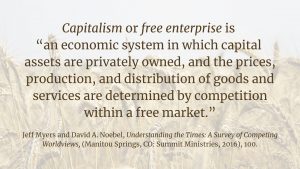
A PDF file of this graphic is available here.
This definitions highlights several key components of free enterprise:
-
-
- Assets are privately owned.
- Assets are privately controlled, but control is not absolute. (See next item.)
- Decisions related to production, distribution, and prices of goods and services are heavily influenced by the variables of and within the free market — especially competition.
-
This is “bare bones” information. Let’s look to an expert who can help us understand the nature of capitalism more fully.

Explain that for 27 years, the late Dr. Ronald Nash (1936-2006) was the Chairman of the Department of Philosophy and Religion and Director of Graduate Studies in Humanities at Western Kentucky University in Bowling Green. Dr. Nash was not only a brilliant theologian but also an astute cultural observer.
Additional background information on Dr. Nash:
-
-
- From 1991 to 2002, he served as Professor of Philosophy and Theology at Reformed Theological Seminary in Orlando, Florida.
- Nash also was Professor of Philosophy at the Southern Baptist Theological Seminary in Louisville, Kentucky, from 1998-2005.
-
In 1985, Hillsdale College’s publication Imprimis (Imprimis means “in the first place”) carried a speech/article by Dr. Nash titled “Socialism, Capitalism, and the Bible.” The article was reproduced with Nash’s permission on the Summit Ministries website. (Summit Ministries exists “to equip and support rising generations to embrace God’s truth and champion a biblical worldview.”)
The following is a key paragraph from the article, because it describes several essential components of capitalism.
Capitalism is not economic anarchy. It recognizes several necessary conditions for the kinds of voluntary relationships it recommends. One of these presuppositions is the existence of inherent human rights, such as the right to make decisions, the right to be free, the right to hold property, and the right to exchange what one owns for something else. Capitalism also presupposes a system of morality. Capitalism should be thought of as a system of voluntary relationships within a framework of laws which protect peoples’ rights against force, fraud, theft, and violations of contracts. “Thou shalt not steal” and “Thou shalt not lie” are part of the underlying moral constraints of the system. Economic exchanges can hardly be voluntary if one participant is coerced, deceived, defrauded, or robbed.
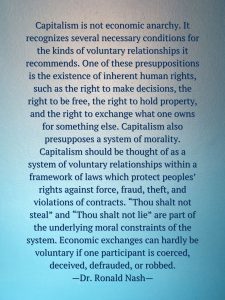
A PDF file of this graphic is available here. A typed copy is available here.
Based on this paragraph, we can carve out the following ten principles. Not all these principles come directly from the paragraph, but all are consistent with it.
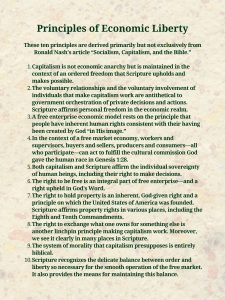
A PDF file of the above graphic is available here. A typed copy is available here.
Say: In this session we will explore the first two of these principles and show how they are tied to biblical truths and ideals.
-
-
- Capitalism is not economic anarchy but is maintained in the context of an ordered freedom that Scripture upholds and makes possible.
- The voluntary relationships and the voluntary involvement of individuals that make capitalism work are antithetical to government orchestration of private decisions and actions. Scripture affirms personal freedom in the economic realm.
-
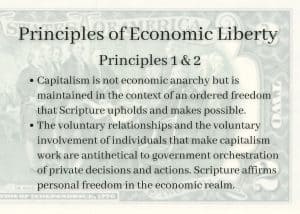
A PDF file of the above graphic is available here.
Principle One
Capitalism is not economic anarchy but is maintained in the context of an ordered freedom that Scripture upholds and makes possible.
Say: Let’s examine and discuss this first principle. We’ll do that by discussing answers to these two questions.
-
-
- How does Scripture make possible a society of order, one in which constructive behavior and productivity are given fertile ground?
- “Capitalism is not economic anarchy” is an important observation. What are some ways in which capitalism itself, as an economic system, regulates human behavior so people contribute to societal order rather than challenging it?
-
QUESTION 1: How does Scripture make possible a society of order, one in which constructive behavior and productivity are given fertile ground?
Ask this question. State: While numerous ways can be cited, we’ll zero in on three.
FIRST, the Bible commends productive and responsible work. The Fourth Commandment, for example, states,
8 “Remember the Sabbath day, to keep it holy. 9 Six days you shall labor and do all your work, 10 but the seventh day is the Sabbath of the Lord your God. In it you shall do no work: you, nor your son, nor your daughter, nor your male servant, nor your female servant, nor your cattle, nor your stranger who is within your gates. 11 For in six days the Lord made the heavens and the earth, the sea, and all that is in them, and rested the seventh day. Therefore the Lord blessed the Sabbath day and hallowed it (Ex. 20:8-11, emphasis added).
Explain: Many, many other passages affirming productive labor appear in the Bible. We will examine a good many of these of these during each of our Bible study sessions. Right now, let’s take a close look at these seven. A printed copy of this material is available here. Reproduce it so each participant can have a copy. Lead your group in discussing the passages and what they teach about work and about God’s expectations of people, especially believers, regarding work.
Ask and discuss: How does every individual’s fulfilling his or her responsibility to work contribute to order and stability in society?
Ask: Which of these seven passages stands out to you personally, and why?
SECOND, Scripture gives government the primary responsibility of punishing those who do wrong and commending or rewarding those who do well. We discussed this in Session 1 (see material under “Government’s Job), but now we need to dig a bit deeper and understand this truth more thoroughly. Consider Romans 13:1-7, 1 Peter 2:13-17, and 1 Timothy 2:1-4 (also go here). Discuss these two insights:
-
-
- When government properly fulfills its God-given responsibility of punishing those who do wrong and commending those who do right, it protects the inherent, God-given rights of citizens.
- Unalienable, God-given rights are not services performed for you or assets given to you by the government or any other entity or individual. They are your inherent freedoms to act on your own, for your own benefit or for the benefit of others. Appropriately, the document that explicitly speaks of God-given rights is the Declaration of Independence, not the Declaration of Dependence.
-
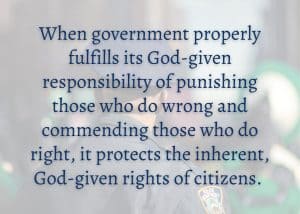
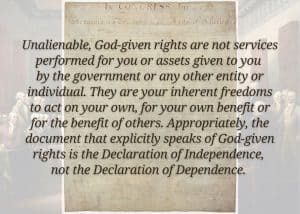
PDF files of these graphics are available here and here.
THIRD, Jesus gave work a sense of purpose and fulfillment that helped to revolutionize society in terms of productivity and human dignity (a matter we will explore in some detail in Session 3).
Ask the participants you’ve enlisted to perform dramatic readings to make their presentations to the large group. First, hear from the individual reading from W. A. Criswell’s sermon; then hear from the one reading from D. James Kennedy’s sermon.
Dr. W. A. Criswell, who for five decades pastored the First Baptist Church of Dallas Texas, preached a sermon titled “Jesus, the Carpenter” on February 10, 1991. His Scriptural text was Mark 6:1-6. Pastor Criswell said this:
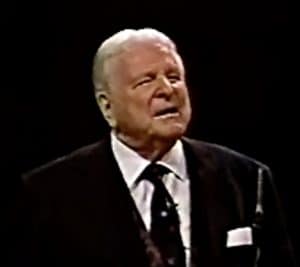
Why didn’t God send His Son into the world that He be a Socratic philosopher, or a student of Plato, or at least one of the great political dynamos of the world? Instead,…He is a carpenter, He is a carpenter. Evidently, Joseph died.…And evidently, Jesus took care of His mother and of His brothers and sisters. And He worked with His hands. His hands were callused. He was a carpenter…so that people who toil and work would feel at home in His presence.
Dr. D. James Kennedy, who for many years was pastor of Coral Ridge Presbyterian Church in Fort Lauderdale, Florida, said this in a sermon titled “the Bible and Civilization,” which he preached in 1983:

Let us consider the matter of labor. Jesus Christ picked up the saw and the hammer and the plane and, in so doing, He wrought a miracle in civilization. Most people are totally unaware of what that did. But it changed the whole concept of work. Do you realize that in antiquity of Greece or Rome that honest work was despised as servile and was consigned to slaves? But Christ came and gave a new dignity to labor. Before the Word of God has come and taken over countries there were only slaves. Half the Roman Empire was slaves; slaves and serfs. But those slaves and serfs in the land where the Gospel of Christ has come have been translated into the working classes. And in America where the Word of God has come more fully than any other land, into the middle classes — and out of poverty and into economic well-being.2
Go here for digital resources to use in sharing these quotes.
If time allows, discuss these preachers’ statements briefly, zeroing in on the difference it makes in productivity, contentment, and satisfaction when workers assume their labors serve an important purpose.

QUESTION 2: What are some ways in which capitalism itself, as an economic system, influences human behavior so people contribute to societal order rather than challenging it? In other words, how does capitalism encourage the societal order the Bible affirms?
Two specific discussion guides are provided to address this question. I call them Sixteen Ideals and Wisdom from Dr. Dobson. Because of time constraints, you probably won’t be able to use both of these, but you can choose which one you prefer to use with your group.
Option 1: Sixteen Ideals
Ask question 2: “What are some ways in which capitalism itself, as an economic system, influences human behavior so people contribute to societal order rather than challenging it? In other words, how does capitalism encourage the societal order the Bible affirms?”
Point out that interestingly, the free enterprise economic model does this by placing natural and constructive requirements on people who operate within it. This means pretty much everyone, to one degree or another.
Share and discuss the following:
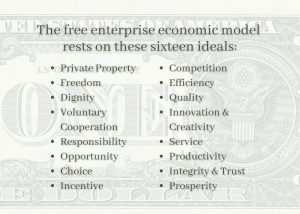
A PDF file of this graphic is available here.
Here are some points of discussion.
-
-
- Note how elements on the list are interconnected. Private property (aka private ownership and management of assets) is named specifically, but it also is represented in items such as responsibility, efficiency, and innovation & creativity.
- Competition is named as well, but it, too, is represented by other items on the list. Competition reinforces the need for, and the incentive to maximize, efficiency and quality. Competition also compels the person or business offering goods and/or services to render excellence to customers.
- Prosperity is named because it’s an important component, but we must understand that it is influenced and even regulated by a variety of factors. Because of this, prosperity cannot be seen as a green light for entrepreneurs and merchants to become greedy and run roughshod over people. One factor regulating one’s ability to become prosperous is service. Within the capitalist system, it is those who serve most efficiently and effectively — those who offer customers and potential customers what they want and are willing to buy — who are most likely to prosper. So the necessity of rendering excellent, first-rate service helps to keep greed in check. So does the demand for quality. Emphasize that economist Walter E. Williams said, “Prior to capitalism, the way people amassed great wealth was by looting, plundering and enslaving their fellow man. Capitalism made it possible to become wealthy by serving your fellow man.” Also, note that Margaret Thatcher said, “We need to create a mood where it is everywhere thought morally right for as many people as possible to acquire capital.” Elaborate: Desiring to acquire wealth and acting within moral and ethical boundaries to acquire it are good things, not evil. Go here for digital graphics showcasing these quotes.
- Summarize: To get ahead or to prosper within the free enterprise system, one must offer excellent goods or services at a reasonable price. This compels a merchant or service provider to be efficient in running his or her business; but this principle isn’t true only for a business owner. It also applies to employees. If an employee does not perform his or her assigned work well, the employer will let that individual go and find someone else who can and will do a better job. Thus, the very nature of capitalism, while allowing for a measure of freedom, also requires order and excellence.
-
The nature and structure of capitalism, while allowing for a good measure of freedom, also requires order and excellence.
Option 2: Wisdom from Dr. Dobson
Say: Remember, this is the question we’re addressing: What are some ways in which capitalism itself, as an economic system, influences human behavior so people contribute to societal order rather than challenging it? In other words, how does capitalism encourage the societal order the Bible affirms?
We can see the strong yet constructive influence of the free enterprise system in a video Dr. James Dobson produced in the 1990s. Dr. Dobson wrote a book and produced a video series directed to teenagers and young adults. They were titled Life on the Edge3 The video/film series now is on You Tube. The following audio clip is from the first film in the series, “Finding God’s Will for Your Life.”

See if you can pick up on various elements of the free enterprise system as Dr. Dobson shares with his audience six things they must “get right” as they consider career choices. As Dr. Dobson names these, he writes them on the chalkboard, so you’ll hear chalk-against-board sounds in the background as you listen. The first clip is just under three minutes.
You must
-
-
- find something you like to do,
- find something you have the ability to do,
- find something you can get permission to do,
- find something you can earn a living doing,
- find something society feels is important, and
- find something God wants you to do.
-

Points for discussion:
-
-
- You must find something you like to do. The free enterprise economic system allows for this. Other economic systems, as well as many cultures in the world, do not.
- You must find something you have the ability to do. This element, of course, makes a great deal of sense. Not only does the free enterprise system allow this; it also encourages it.
- You must find something you can get permission to do. This is one of the limitations of capitalism, but it’s a very reasonable one.
- You must find something you can earn a living doing. Here we see clear evidence of the free enterprise model. This element also makes a great deal of sense. Capitalism encourages participants to make the most of opportunities, but it also is practical and realistic.
- You must find something society feels is important. To succeed (see item 4) you must serve others; you must render a service or provide a product that people want and are willing to purchase. Thus, in the free enterprise system, your success benefits others.
- You must find something God wants you to do. Capitalism allows people to serve God in their work. In socialist and communist societies, people must serve the state.
-
In relation to this sixth item, Dr. Dobson warns his audience in the video, and his readers in the book, that fulfillment in life does not come just from experiencing professional success or from achieving one’s goals. Christians need to maintain an eternal perspective and serve God in all they do. Hear these important words from the founder of Focus on the Family and Family Talk. This clip is just over one minute long.
In college, Dr. Dobson had a goal to win in the tennis competition in which his school was involved. He did; during his junior and senior years he won the trophy. He was proud of his accomplishments.
A number of years later, however, his time in the spotlight had passed, and a friend of his found the trophy with Dr. Dobson’s name on it in the dumpster behind the administration building where the trophy case was located. His friend dug the trophy out of the trash, had it cleaned and repaired, and gave it to Dr. Dobson; but the lesson was clear. “IF YOU LIVE LONG ENOUGH,” writes Dr. Dobson, “LIFE WILL TRASH YOUR TROPHIES TOO! I don’t care how important something seems at the time, if it is an end in itself, the passage of time will render it old and tarnished.”4 Again, Christians must keep an eternal perspective in every endeavor they undertake.
Emphasize: This important reminder helps to answer a question we posed earlier in the session: “How does Scripture make possible a society of order, one in which productivity is given fertile ground?” Dr. Dobson’s encouragement to his listeners and readers highlights one more way. Capitalism allows consumers and producers to put God first and to maintain an eternal perspective in their economic activities. This, of course, is something Scripture commands (see Matt. 6:33; 10:37-39; 16:24-25; Luke 12:13-21).
Say: Let’s move on to the second principle.
Principle Two
The voluntary relationships and the voluntary involvement of individuals that make capitalism work are antithetical to government orchestration of private decisions and actions. Scripture affirms personal freedom in the economic realm.

A PDF file of this graphic is available here.
Encourage your participants to think of the many relationships a player in the free enterprise economic system has, and that these are voluntary, not forced, with regard to
-
-
- purchases of goods
- purchases of services
- food purchases
- lease and rental agreements
- real estate
- communication options (including phone and internet services)
- employment (whether one is an employee or an employer)
- the location of one’s residence
- travel
- entertainment choices
- investments
- charitable contributions
- advertising and marketing (whether one is a producer or consumer)
-
Of course, some of the arrangements may involve contracts or other agreements; and a variety of factors may, and usually do, influence decisions and the duration of commitments. This does not change the fact that transactions and relationships themselves are voluntary, not forced. A person is obligated once he or she enters into an agreement, but not before.
All of this relates to property rights, a matter we will dive into and explore during Session 5. For now, the emphasis on voluntary relationships is critical. We engage in these relationships so frequently that we fail to appreciate the fact that they are not orchestrated. We glean this material and adapt it from this article.
Acts 2:44-45 and 4:34-35 are used by advocates of socialism and “social justice” in making the case that the Bible teaches socialism. But does it? We’ll use these same Scriptures to show that it does not. Acts 5:1-11 also is pertinent to our discussion. Let’s consider five points. These have been adapted from this article.
Divide the large group into five smaller groups and ask each group to appoint a willing leader, one who will facilitate a brief discussion. Here are the assignments. After a few minutes, ask each group to give a brief report, or summary, of its discussion. For your convenience, here are the assignments on one page. They’re also printed below.
Do Acts 2:44-45 and 4:34-35 indicate the early church practiced socialism? Also, how are the economic relationships of capitalism and socialism different? Let’s have a look at these passages. Acts 5:1-11 also is pertinent to our discussion. Here are the Bible passages in context.
-
-
- Group 1: Discuss these insights: The spontaneous generosity of church members arose in a context of a community of committed believers who feared God, praised God, and were overcome with a sense of awe regarding what He was doing in their midst. Generosity is commanded in Scripture (here are three of many such passages: Prov. 11:24-25; Acts 20:35; 1 Tim. 6:17-19). When “giving” is coerced, it is not giving; nor is it charity. Socialism and its related systems advocate a forced redistribution of wealth and resources. Contrast the outcome of spontaneous, voluntary giving in the church (God is glorified) to the outcome when transfer of wealth is forced by the government (the state is seen as the source of resources and gets credit for meeting needs). What additional things occur?
- Group 2: Discuss these insights: When those involved in the early church “had all things in common” (Acts 2:44), none of the goods that made up the store of common resources was owned by the group from the outset; instead, each item of value, whether money or goods, was donated freely and voluntarily. Ownership of assets was transferred when the original owner donated or sold them. Describe how God is glorified and relationships are strengthened within the church when giving to meet needs is voluntary. Contrast this scenario to what happens to relationships when the government taxes wealth and redistributes it to those deemed to be in need.
- Group 3: Discuss these insights: The free and voluntary donations came from individuals and families who owned them privately. The government was not involved; nor was the community of believers considered to be owner of anything that was not donated. What happens to relationships when someone assumes he owns something he really does not?
- Group 4: Discuss these insights: Those who gave to meet the needs of fellow church members laid their donations “at the apostles’ feet” (4:35). That makes it a “slam dunk” that the church didn’t engage in socialism! Advocates of socialism want people’s money to go to the government, not to the church! Discuss: What happens when the state starts to meddle in the affairs of the church?
- Group 5: Discuss these insights: Property rights and the right to voluntarily engage in economic transactions were explicitly affirmed, even while the church still was using the common store approach. In Acts 5:1-11, Peter himself affirmed these rights. When donations were being made to the common treasury, Ananias and Sapphira, a husband and wife, sold a piece of property and brought a portion of the proceeds to the apostles. They claimed they were bringing the entire amount but actually held a portion back. Their primary offense wasn’t failing to donate all of the proceeds, but lying about their gift. To their own peril, they lied to God Himself. Discuss: How did Peter affirm property rights in Acts 5:3-4? What does the phrase “in your own control” mean in practical terms?
-
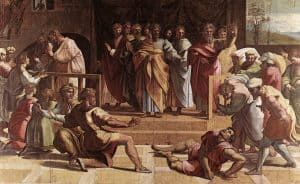
Display the graphic below as you summarize the points highlighted by the spokespersons from the five discussion groups.
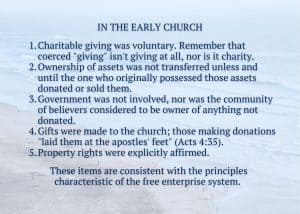
A PDF file of this graphic is available here.
Here is an overall summary: The relationships on which capitalism depends are voluntary, not forced. If economic relationships are forced, the system in place isn’t free enterprise. Historian and sociologist Alvin Schmidt observes, “If we fail to understand that the involuntary, coercive nature of socialism and its state socialist programs is highly incompatible with the economic practices that some of the early Christians engaged in when they voluntarily ‘had all things in common’ (Acts 2:44, NKJV), we may think that socialism is a good way to practice Christianity.…[Yet] something that is done involuntarily or as a result of compulsion is no longer Christian.”5
Share this quote from Dr. Schmidt. Express to participants they may remember a similar quote from him from their assignment, “Choose Wisely.” The point bears repeating here, because it is so easy to take for granted the liberty we have, and the relationships in which we freely engage, when we perform all kinds of economic transactions under the free enterprise system.
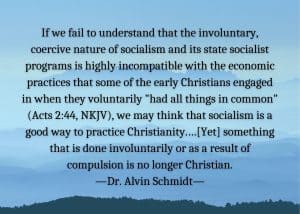
A PDF file of this graphic is available here.
A Warning: Government — Even a Well-Intentioned One — Can Mess Things Up
Observe: All of us need to appreciate more fully the freedom we have under capitalism and the voluntary nature of the relationships we engage in when we make financial decisions and transactions. Sometimes the government, even with good intentions, will interfere with those relationships — but at the time it doesn’t look like interference. It looks like help. Even so, we need to heed an important warning from Dr. Ronald Nash. As much as possible, relationships involving finances need to be kept private. This means the government needs to keep its distance. This is the best way to preserve the quality of the voluntary relationships capitalism allows us to have. Dr. Nash states,
One dominant feature of capitalism is economic freedom, the right of people to exchange things voluntarily, free from force, fraud, and theft. Socialism, on the other hand, seeks to replace the freedom of the market with a group of central planners who exercise control over essential market functions. There are degrees of socialism as there are degrees of capitalism in the real world. But basic to any form of socialism is distrust of or contempt for the market process and the desire to replace the freedom of the market with some form of centralized control. Generally speaking, as one moves along the continuum of socialism to capitalism, one finds the following: the more freedom a socialist allows, the closer his position is to interventionism; the more freedom an interventionist allows, the closer his position is to capitalism. The crux is the extent to which human beings will be permitted to exercise their own choices in the economic sphere of life.
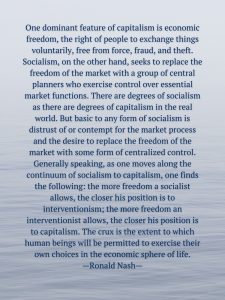
A PDF file of this graphic is available here.
Here is some background information relating to this statement.
Discuss interventionism briefly. Discuss the impact it can have on capitalism’s voluntary relationships, however well-intentioned government might be.
Session 2: Conclusion
Say: As we continue to look at the free enterprise system and biblical teachings, we will see increasing evidence the Bible affirms the core principles of the free market and rejects the tyranny of socialism and similar systems.
Share that an orthodox rabbi, Daniel Lapin, made this statement. It is worthy of serious reflection.
The atheist himself recognizes that, to be true to his credo, he must reject the free market because it is appointed by a God in whom he does not believe. The world still awaits a society that has embraced atheism and also operates a successful free market.
—Rabbi Daniel Lapin6—
Say: We’ll begin our next session by looking at this quote more closely and providing a rationale for it.
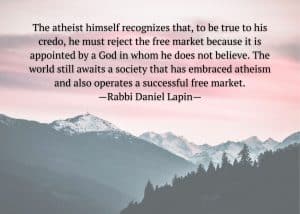
A PDF file of this graphic is available here.
Close in prayer: Lord, thank You that the free enterprise system allows for freedom without chaos. Thank Him for ordered liberty. In Jesus’ name. Amen.
Looking Ahead
Session 3 will explore the theme of human dignity by examining principles 3 & 4. These principles are highlighted in part 2 of the series “The Bible and Free Enterprise.”
-
-
- A free enterprise economic model rests on the principle that people have inherent human rights consistent with their having been created by God “in His image.”
- In the context of a free market economy, workers and supervisors, buyers and sellers, producers and consumers—all who participate—can act to fulfill the cultural commission God gave the human race in Genesis 1:28.
-
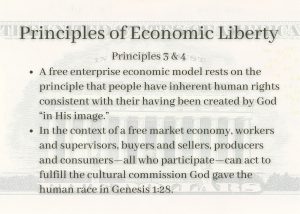
A PDF file of this graphic is available here.
-
-
- Session 3 is available here.
- List of Principles of Economic Liberty
- Principles of Economic Liberty Bible Study Home Page
-
Copyright © 2021 by B. Nathaniel Sullivan. All rights reserved.
top image credit: Photo by Bence Balla Schottner on Unsplash
image credit: Dr. Ronald Nash
Unless otherwise indicated, Scripture has been taken from the New King James Version®. Copyright © 1982 by Thomas Nelson, Inc. Used by permission. All rights reserved.
Notes:
1Jeff Myers and David A. Noebel, Understanding the Times: A Survey of Competing Worldviews, (Manitou Springs, CO: Summit Ministries, 2016), 100.
2Jerry Newcombe, compiler, The Wit and Wisdom of D. James Kennedy, (Fort Lauderdale, FL: Truth in Action Ministries, 2013), 234. (Very minor edits were made for clarity and consistency.)
3Book: Dr. James Dobson, Life on the Edge: A Young Adult’s Guide to a Meaningful Future, (Dallas: Word, 1995). Video Series: Dr. James Dobson, Life on the Edge: Preparing for the Challenges of Adulthood, a 7-session Video Course for Youth (Dallas: Word, 1993).
4Dr. James Dobson, Life on the Edge: A Young Adult’s Guide to a Meaningful Future, (Dallas: Word, 1995), 61.
5Alvin J. Schmidt, How Christianity Changed the World, (Grand Rapids: Zondervan, 2004), 205-206.
6Rabbi Daniel Lapin, America’s Real War: An Orthodox Rabbi Insists that Judeo-Christian Values Are Vital for Our Nation’s Survival, (Sisters, OR: Multnomah Publishers, 1999), 217.
